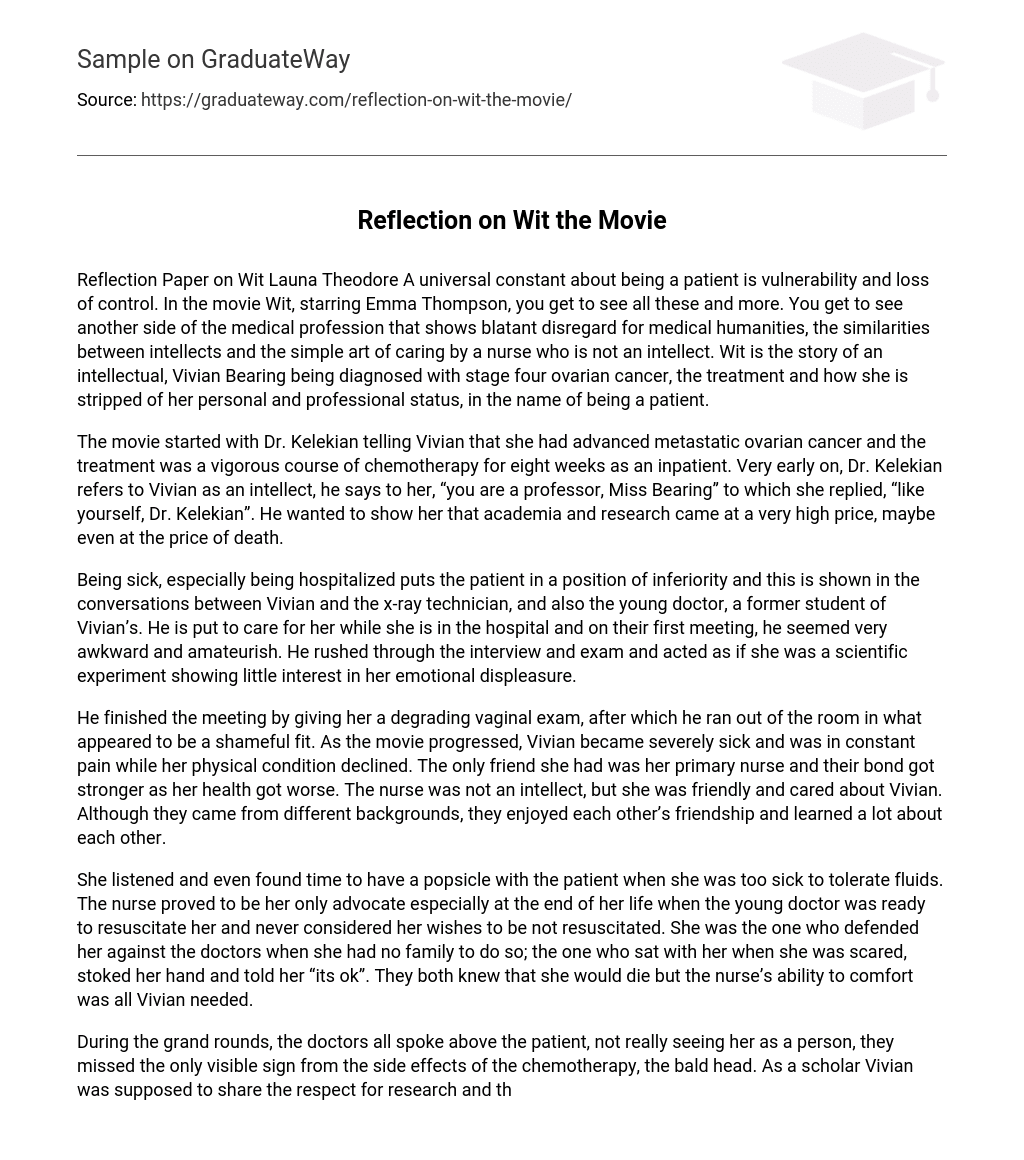Reflection Paper on Wit Launa Theodore A universal constant about being a patient is vulnerability and loss of control. In the movie Wit, starring Emma Thompson, you get to see all these and more. You get to see another side of the medical profession that shows blatant disregard for medical humanities, the similarities between intellects and the simple art of caring by a nurse who is not an intellect. Wit is the story of an intellectual, Vivian Bearing being diagnosed with stage four ovarian cancer, the treatment and how she is stripped of her personal and professional status, in the name of being a patient.
The movie started with Dr. Kelekian telling Vivian that she had advanced metastatic ovarian cancer and the treatment was a vigorous course of chemotherapy for eight weeks as an inpatient. Very early on, Dr. Kelekian refers to Vivian as an intellect, he says to her, “you are a professor, Miss Bearing” to which she replied, “like yourself, Dr. Kelekian”. He wanted to show her that academia and research came at a very high price, maybe even at the price of death.
Being sick, especially being hospitalized puts the patient in a position of inferiority and this is shown in the conversations between Vivian and the x-ray technician, and also the young doctor, a former student of Vivian’s. He is put to care for her while she is in the hospital and on their first meeting, he seemed very awkward and amateurish. He rushed through the interview and exam and acted as if she was a scientific experiment showing little interest in her emotional displeasure.
He finished the meeting by giving her a degrading vaginal exam, after which he ran out of the room in what appeared to be a shameful fit. As the movie progressed, Vivian became severely sick and was in constant pain while her physical condition declined. The only friend she had was her primary nurse and their bond got stronger as her health got worse. The nurse was not an intellect, but she was friendly and cared about Vivian. Although they came from different backgrounds, they enjoyed each other’s friendship and learned a lot about each other.
She listened and even found time to have a popsicle with the patient when she was too sick to tolerate fluids. The nurse proved to be her only advocate especially at the end of her life when the young doctor was ready to resuscitate her and never considered her wishes to be not resuscitated. She was the one who defended her against the doctors when she had no family to do so; the one who sat with her when she was scared, stoked her hand and told her “its ok”. They both knew that she would die but the nurse’s ability to comfort was all Vivian needed.
During the grand rounds, the doctors all spoke above the patient, not really seeing her as a person, they missed the only visible sign from the side effects of the chemotherapy, the bald head. As a scholar Vivian was supposed to share the respect for research and the impersonality with minimal personal involvement that entailed. She finally broke down and could no more play the professional intellectual role, she became afraid and needed human contact, so she talked to Jason about his fascination with cancer.
He showed an inconsiderate side by talking about the bedside manners course as a “colossal waste of time for researchers”, and he also implied that although he told his patients he would miss them after death, he did not really feel any grief. She who seemed not to be a sentimentalist hesitated for what she was hearing and he took her hesitation as a symptom of short term memory loss, asking: “Professor Bearing , who is the President of the United States? ”. This made her think about the choices she had made in her life, academia over something more people oriented.
As nurses, we have the opportunity to strengthen our profession by making sure these medical inhumanities are stopped. With care presently being centered around the patients, we can be better advocates. Even doctors are now being trained to see the patients as a whole instead of a part. If as nurses we can understand the process of being a patient, the constant pain, the loss of modesty, being dependent on others for everything, the not knowing of what is next and just lying in a bed with nothing to do but worry, then I think we can substancially care for our patients with empathy and be the nurses Florence Nightingale envisioned.





